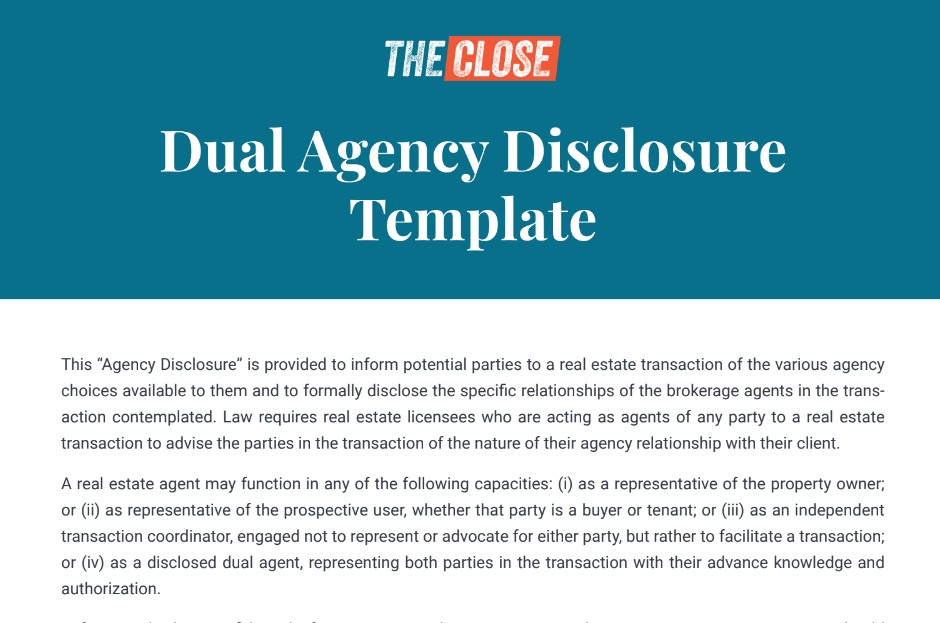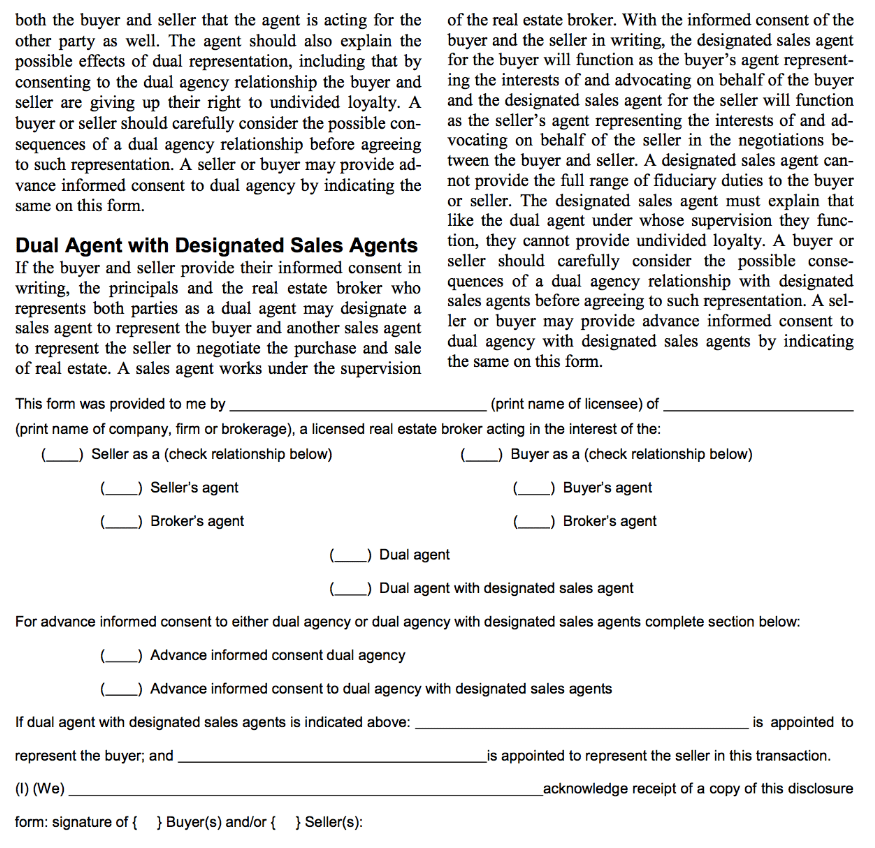What’s better than one real estate client? Two! With dual agency, a real estate agent gets to represent both the buyer and seller in one transaction. While dual agency can be efficient and reduce communication, it causes a potential conflict of interest. This guide will cover what dual agency is, its pros and cons, and legal considerations, and help agents work through operating as a dual agent effectively and ethically.
⭐Bonus: Download the Dual Agency Agreement Template⭐

Disclaimer: Check with your state and brokerage to see if they have specific dual agency forms you need to use
What Is Dual Agency?

The real estate term dual agency is when a real estate agent represents both parties in a transaction. A dual agency relationship differs from a single agency in that the buyer and seller are represented by the same agent, who has to balance the interests of two clients. While this could streamline the buying and selling process, it also includes a lot of challenges regarding objectivity and confidentiality.
The real estate agent in a dual agency has a code of ethics that must be rigidly adhered to to deal fairly with both parties. This includes fully disclosing the dual agency relationship with a dual agency agreement and getting informed consent from the buyer and the seller. Otherwise, there may be some legal implications from such a breach of fiduciary duty.
What Is a Dual Agency Agreement?

A dual agency agreement is a critical document that ensures explicit agreement on the facts of a dual agency relationship between the agent and buyer and seller. The role played by the agent, with the limitations of dual agency, must be understood by both the buyer and the seller. The important components of the dual agency agreement include:
- Disclosure: This refers to the clear explanation given to the principal about the nature and extent of the dual agency relationship, including the possible benefits and associated risks.
- Consent: Both parties must consent in writing to their understanding and acceptance of the dual agency arrangement.
- Responsibilities: A detailed description of what duties the agent will perform. This idea would include maintaining neutrality, confidentiality, and adhering to their fiduciary duty.
- Compensation: In case of a reduced commission rate pact, how will their commission be divided or handled.
Responsibilities of a Dual Agent
Since the agent represents both buyer and seller in the case of dual agency, they should deal with their buyers’ and sellers’ interests impartially. Agents must also balance their responsibilities to ensure fairness and adherence to high ethical standards. Some of the responsibilities in a dual agent real estate situation are:
- Impartialness: The agent should be unbiased and avoid doing anything to benefit one party at the expense of the other. It is challenging since the agent has to balance the interests of the two clients under their control.
- Disclosure: The agent shall disclose all the material facts about the property to both parties. Material fact means any information that may influence a buyer’s judgment or impair a seller’s ability to sell a property.
- Confidentiality: The agent is bound not to disclose any confidential information from one party to the other without explicit prior consent. This confidentiality protects sensitive information that includes negotiation strategies or personal financial details.
- Fiduciary duties: These include the duties of care, loyalty, and obedience to both clients. An agent should always protect the best interests of both parties. They are bound to give honest and competent advice without compromising either party’s interests.
Commission in Dual Agency
Since only one agent or real estate brokerage is involved, a dual agency may make the commission structure a bit easier. Agents can be lenient with their commission rate in a dual agency scenario because no other agent is involved.
Therefore, they don’t have to worry about another agent’s involvement if they want to discount their commission by a percentage to get the deal done and benefit their clients. However, it should be very clear exactly how the commission division works as outlined in the dual agency agreement and where the cost savings are for both the buyer and seller.
Pros & Cons of a Dual Agency
Agents should consider dual representation real estate if both the buyer and seller want a smooth and efficient transaction and both parties are comfortable with one agent representing both sides. It can be of great value if an agent has specific knowledge about the property and the local market, providing value to both parties.
Another advantage associated with a dual agency is the leeway to negotiate commission rates, thus benefitting the deal. In dual agency, however, there are potential conflicts of interest between both parties, and each party needs to be aware and comfortable moving forward. Knowing the dual agency pros and cons will help you decide whether you want to put yourself in that situation.
In Which States Are Dual Agency Legal?
Dual agency is legal in many states, although regulations and requirements differ from state to state. States that do allow dual agency require the agents to follow certain disclosure and consent procedures. Dual agency is not permissible in these states:
- Alaska
- Colorado
- Florida
- Kansas
- Maryland
- Texas
- Vermont
- Wyoming
Agents should familiarize themselves with the laws of their state on dual agency so they don’t get involved in illegal activities. This includes knowing additional documentation or disclosure that may be required and how such agreements and letters to clients are to be worded.
Tips to Operate as a Dual Agent
Great care and rigid adherence to ethics should be taken when operating as a dual agent to avoid conflicts of interest and loss of trust. Successful navigation of dual agency is characterized by clear communication, neutrality, and professional integrity. Consider the key practices for effective management of dual agency:
Tip 1: Provide Full Disclosure
Make sure the two parties are fully aware of the existence of a dual agency relationship right from the very start. This would be important in establishing trust and ensuring that both the buyer and the seller know that the agent represents both of them. Full disclosure avoids misunderstanding and possible legal disputes in the future.
Tip 2: Stay Neutral
No act on an agent’s part should be interpreted as favoring one party over another. Provide each client with roughly equal service, information, and comparable support. This helps to establish confidence in the process by assuring both buyer and seller of fair treatment. Balance the needs and interests of both parties without compromising either side.
Tip 3: Use Clear Communication
The agent shall maintain clear and truthful communication with the parties involved. This includes timely progress reports regarding the transaction and immediate disclosure of any material facts or problems as they arise. Effective communication shall help keep both clients fully informed and involved, thereby preventing or minimizing the potential for conflict and misunderstanding. Both parties are to receive timely, accurate information, which will help facilitate informed decision-making.
Tip 4: Practice Professionalism
Abide by statutory and regulatory state requirements relevant to a dual agency that include confidentiality, the truthfulness of information, and loyalty to the client’s interest. The responsible management of a dual agency means being professional in ensuring all acts are within the confines of the law and ethical standards. High professional standards foster trust with one’s clients and facilitate the transaction process through its successful completion.
Scripts to Use When Clients Ask About Dual Agency
Whenever a client inquires about dual agency in real estate, it is important to respond clearly and with simple language that dispels their fears with clear transparency and total neutrality. Whether describing how the dual agency works, explaining possible conflicts of interest, or just outlining it as an option, your responses reassure the client that their interests will be equally well-guarded.
The following scripts will guide you through these conversations confidently and help your clients fully understand the implications of dual agency.
Script 1: Explaining Dual Agency to a Client
Client: “What exactly is dual agency, and how does it work?”
Agent: “Good question. Dual agency would exist if I represented you, the buyer, and the seller in the same transaction. Basically, I have a duty to both of you, and I must remain neutral throughout. I will work to facilitate the transaction as efficiently and smoothly as possible while providing the same service and flow of information to you and the seller.
I’ll disclose all material facts about the property to both parties, but I won’t be able to advocate for one party over the other. What’s important is that both of us, as well as the seller, be comfortable with the situation, and we would all need to sign a dual agency agreement to proceed.”
Script 2: Addressing Concerns About Conflicts of Interest
Client: “I’m worried that you might be biased towards the seller since you’re representing both of us.”
Agent: “I completely understand your concern, which I take very seriously. I am supposed to be impartial as a dual agent, offering you and the seller the same level of service while providing both of you with all the information. Therefore, I won’t be able to choose one side over the other or give only one side confidential information.
My role is to ensure both parties have the facts they need to make the best decisions possible. If you ever feel uncomfortable or if, at some point, you believe there is a conflict of interest, then we can discuss it and determine what is best.
Script 3: Pitching Dual Agency to a Client
Agent: “I would like to discuss an option with you that would very much befit your situation: dual agency. This would make me the representative of both you and the buyer. This would streamline communication between us and save us time during negotiations. Because you know I am knowledgeable of the local market, the information and advice I will provide will be useful to both parties involved.
Plus, because I would be handling both ends of the transaction, there would be some opportunity to negotiate a slightly lower commission being paid out on my part, which could save you money. Of course, I would work through that process in a completely neutral and open way. If this is something you’d be open to, I’d be happy to run through the details and answer any questions you might have.”
Script 4: Responding to a Client’s Hesitation About Dual Agency
Client: “I’m not sure if I’m comfortable with dual agency. What happens if I decide not to go with it?”
Agent: “It’s normal that you should have reservations about dual agency, and that is quite understandable. You must be sure of the decision you are making. If you don’t want to proceed with dual agency, we can certainly look at other options, such as separate representation for each party. The key is to choose a situation that makes you feel most comfortable and confident about the transaction. I am here to support you either way and will be sure that your best interest is protected.”
FAQs
Should real estate agents avoid dual agency?
Real estate agents should be very wary of dual agency’s pitfalls and inherent conflicts. However, in some aspects, it might appear efficient, and there are some benefits for both the buyer and seller. Dual agency, nonetheless, demands that the agent be quite strict in neutrality to avoid tending toward one party more than the other. If not handled carefully, it can open up the potential for lawsuits and a loss of client trust. These are factors that the agents should consider in determining their ability to protect ethical standards before entering into a dual agency.
What is an example of a dual agency?
For example, an agent lists a house for sale, and a buyer comes to the open house without representation. The buyer wants to submit an offer but wishes to have their own representation. If both parties agree, the listing agent can offer services and become a dual agent.
What is the difference between a sub-agency and a dual agency?
In a sub-agency, a sub-agent is hired by the listing agent to assist in finding a buyer for the property. The sub-agent represents the seller’s interest and owes fiduciary duties to the seller. The sub-agent does not represent the buyer; they are considered a customer rather than a client. Whereas in a dual agency scenario, a real estate agent represents the buyer and seller in the same transaction. An agent is required to be impartial, not partial or biased toward either party in any way.
Bringing It All Together
Proper navigation of dual agency requires some thought and clear communication to ensure a fair and efficient transaction for buyers and sellers. The ins and outs of how commissions work, when it’s proper to represent both parties, and formalizing that relationship with a detailed dual agency agreement are all essential considerations. This navigation enables agents to maintain transparency, neutrality, and professionalism in dealing with dual agency situations and support increasing their gross commission income (GCI).










Add comment